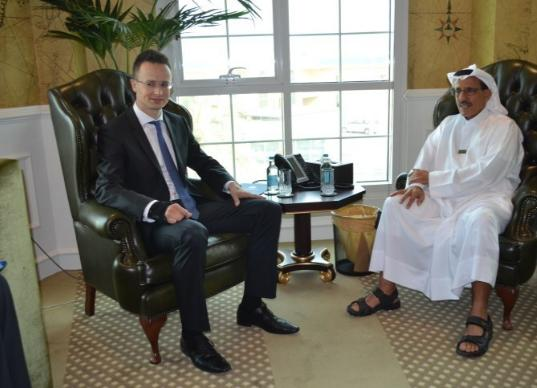
The present writing is an argument against the new direction of foreign policy announced by the third Orbán government. It appears that the country’s new diplomatic leadership has taken the wrong path in at least two important aspects.
(originally published in Hungarian. English translation and publication by HungaryToday, http://hungarytoday.hu/cikk/ferenc-horcher-whats-wrong-shuttlecock-foreign-policy-55359)
In the life of a politician, it is a highly extraordinary opportunity to be entrusted for a third term by voters, having completed two full government cycles. However, the experienced politician knows that gaining power, in a certain sense, is easier than holding onto it and managing its merits.
My conviction is that partly due to the exigency of having to wage two further election campaigns parallel to forming government, the Orbán government was unable to successfully begin this third term. I believe that by assigning clearly too many competences to the head of the Chancellery, the prime minister took an unnecessarily great risk even in establishing the structure of government.
However, in this article I only wish to address a fracture of the entire subject, foreign policy. In my opinion, blame can be laid on the strategy pursued by the newly established diplomatic leadership on at least two major points. I will deal neither with the person of the minister (although I am convinced that it was a mistake to place him in this position at such a young age) nor disputed procedures of organisational restructuring (despite my opinion that, especially in the case of an unexperienced leader, it is more than a mistake to dismiss 100 subordinates shortly after taking office). As a political philosopher, I am primarily interested in the strategy pursued by the ministry, which I would here like to criticise at two points:
- I believe that the hypothesis of the necessity of overshadowing foreign affairs by external economic policy is wrong;
- as is the view that is is possible to pursue some kind of “shuttlecock policy” while following the national interest.
Let us address the two theses individually.
With regard to the relationship between foreign affairs and external economic relations, my views can be described as conservative. I believe that diplomacy is a profession with traditions spanning centuries and even thousands of years. Disregarding these traditions would be unwise because international relations require a very thorough analysis regardless of whether we are talking of relations between two states or a multilateral network of connections. External economic relations, without doubt, play an important role in this all-time deliberation; however, I believe that it is not at all correct if the latter gains dominance and overshadows classical diplomacy. Good diplomatic relations are a fundamental requirement of managing or developing economic relations and concluding an economic agreement is worthless if the necessary conditions in foreign affairs are absent. An ambassador represents the country of dispatch when serving abroad; and the country of dispatch is lead by its prime minister, not its minister for economy. The head of government has to be represented by foreign policy experts, whose work is of course aided at all embassies by a member of multiple members of staff competent in economics. If the situation is different and power relations turn around, we arrive at a situation similar to sitting backwards on a horse: the direction of politics should not be determined by the economy but rather it is the task of politics to determine economic measures. This is why the argument “Why shouldn’t we strive to foster fruitful economic relations with Russia if Germany does the same?” appears to be misguided. This suggestion fails to take account of the fact that Germany firstly created an appropriate system of conditions in foreign policy, which in the case of Hungary is simply not at hand and if we do not strive to create a basis for broadening room for economic manoeuvre with the methods of foreign policy, we will have no chance of developing economic relations.

The second critical consideration in the ministry’s new outlook is perhaps even more important. It seems that according to the new leadership, relationships with natural allies such as Poland or Estonia can easily be given up referring to the national interest and historical connections may also be marginalised by the interests of the national economy, as is the case in relations with Russia. The view according to which we have no long-term principles in foreign policy which define the country’s international orientation on a historical or theoretical basis overlapping governmental cycles appears distinctly false to me. This understanding suggests that all existing relationships should be recalculated with an “interest calculus” and if no positive balance can be detected, the given relationship can be broken up, is worthless and can be sacrificed in favour of seemingly more favourable different one.
In reality, the results of fostering foreign relations cannot be drawn through short-term calculations. We are expressly talking about a political relationship in which long-term trustfulness, reliability and calculability are of prime importance; as states are unable to see into the domestic affairs of eachother, the concepts in connection with them can oly be derived from actual political statements. If a state behaves hectically, its intentions will be unclear, making it an unreliable partner in the world of international relations. Other parties will not only be more weary of unreliable partners in foreign affairs but such conduct will also fail to result in favourable economic relations.
On the whole, we must conclude that calculations based purely on material interests and leading to “shuttlecock policy”, thus rendering the country inscrutable for its partners, as is the prioritisation of external economic relations in favour of diplomatic relations, conducted according to norms spanning centuries. If primacy is denied from the economy in domestic affairs, why should this be different in managing external relations? It it easy to recognise that without an appropriate foreign affairs strategy, our economic position will be unable to improve and the appearance of promising economic partners is worthless if we fail to create an appropriate framework of conditions for foreign policy.
The author is a professor of political philosophy at the Pázmány Péter Catholic University and also teaches at Eötvös Loránd University and the Jagellonian University of Kraków. He is also active as a researcher at the Institute of Philosophy of the Hungarian Academy of Sciences.
original in Hungarian, mosmaiorum.blog.hu
photo: szombat.hu





